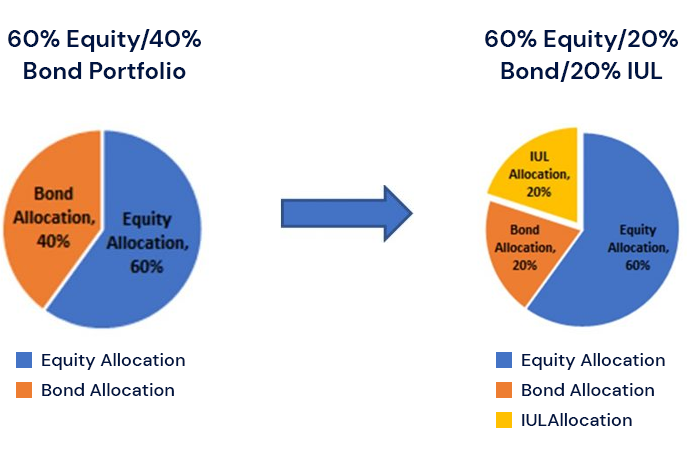All Categories
Featured
Table of Contents
Do they compare the IUL to something like the Vanguard Total Amount Stock Market Fund Admiral Shares with no load, an expense proportion (ER) of 5 basis points, a turn over proportion of 4.3%, and an exceptional tax-efficient document of circulations? No, they contrast it to some dreadful actively taken care of fund with an 8% load, a 2% ER, an 80% turn over proportion, and an awful record of temporary funding gain circulations.
Shared funds typically make yearly taxable circulations to fund proprietors, also when the worth of their fund has dropped in worth. Mutual funds not only require revenue coverage (and the resulting yearly taxes) when the shared fund is going up in value, but can likewise impose income tax obligations in a year when the fund has gone down in worth.
That's not exactly how mutual funds function. You can tax-manage the fund, harvesting losses and gains in order to minimize taxable circulations to the investors, yet that isn't in some way going to alter the reported return of the fund. Just Bernie Madoff types can do that. IULs stay clear of myriad tax traps. The ownership of common funds might require the shared fund owner to pay estimated tax obligations.

IULs are easy to position to ensure that, at the owner's fatality, the recipient is not subject to either revenue or estate tax obligations. The same tax obligation reduction methods do not work almost also with mutual funds. There are countless, typically pricey, tax traps related to the moment trading of shared fund shares, catches that do not apply to indexed life Insurance coverage.
Chances aren't extremely high that you're going to be subject to the AMT because of your common fund circulations if you aren't without them. The rest of this one is half-truths at finest. While it is true that there is no revenue tax obligation due to your beneficiaries when they acquire the proceeds of your IUL plan, it is likewise true that there is no income tax obligation due to your beneficiaries when they inherit a mutual fund in a taxable account from you.
Ul Mutual Insurance Company
There are better means to stay clear of estate tax obligation concerns than getting investments with low returns. Common funds might cause revenue taxes of Social Safety and security advantages.

The development within the IUL is tax-deferred and might be taken as tax obligation cost-free income by means of car loans. The plan proprietor (vs. the common fund supervisor) is in control of his/her reportable income, hence allowing them to reduce or also eliminate the taxes of their Social Safety and security benefits. This one is wonderful.
Right here's an additional minimal concern. It holds true if you buy a common fund for claim $10 per share right before the circulation date, and it disperses a $0.50 distribution, you are then going to owe taxes (most likely 7-10 cents per share) in spite of the reality that you have not yet had any kind of gains.
In the end, it's actually concerning the after-tax return, not how much you pay in tax obligations. You're additionally possibly going to have even more cash after paying those tax obligations. The record-keeping demands for having common funds are significantly more intricate.
With an IUL, one's records are kept by the insurer, copies of annual declarations are mailed to the owner, and circulations (if any) are completed and reported at year end. This set is likewise sort of silly. Certainly you ought to maintain your tax obligation records in situation of an audit.
Fixed Indexed Life Insurance
Barely a reason to purchase life insurance. Common funds are typically component of a decedent's probated estate.
Additionally, they undergo the delays and expenditures of probate. The proceeds of the IUL policy, on the various other hand, is always a non-probate circulation that passes beyond probate straight to one's called recipients, and is consequently not subject to one's posthumous creditors, unwanted public disclosure, or similar delays and expenses.
Medicaid incompetency and lifetime earnings. An IUL can offer their proprietors with a stream of revenue for their whole lifetime, regardless of how lengthy they live.

This is helpful when arranging one's affairs, and transforming properties to income prior to an assisted living facility confinement. Common funds can not be converted in a comparable fashion, and are generally thought about countable Medicaid possessions. This is an additional silly one advocating that poor individuals (you recognize, the ones that need Medicaid, a federal government program for the bad, to pay for their assisted living facility) should make use of IUL as opposed to common funds.
Whole Life Insurance Vs Indexed Universal Life
And life insurance policy looks dreadful when compared rather against a retirement account. Second, people who have cash to buy IUL above and past their pension are mosting likely to have to be horrible at handling cash in order to ever before get approved for Medicaid to spend for their nursing home expenses.
Chronic and incurable disease biker. All plans will certainly permit a proprietor's simple accessibility to cash from their plan, typically waiving any type of surrender fines when such people suffer a serious health problem, need at-home treatment, or become restricted to a retirement home. Common funds do not provide a similar waiver when contingent deferred sales charges still use to a common fund account whose owner requires to sell some shares to fund the costs of such a keep.
Ffiul Insurance
You get to pay more for that advantage (rider) with an insurance policy. Indexed universal life insurance policy supplies death benefits to the beneficiaries of the IUL proprietors, and neither the proprietor nor the beneficiary can ever before shed cash due to a down market.
Now, ask on your own, do you really need or want a survivor benefit? I absolutely don't need one after I reach economic independence. Do I want one? I mean if it were affordable sufficient. Obviously, it isn't cheap. Generally, a buyer of life insurance policy pays for truth price of the life insurance policy advantage, plus the costs of the policy, plus the earnings of the insurer.
Vul Vs Iul
I'm not entirely sure why Mr. Morais threw in the entire "you can not shed money" again right here as it was covered rather well in # 1. He just intended to repeat the most effective selling point for these points I intend. Again, you don't shed nominal dollars, but you can lose actual dollars, in addition to face major chance price because of reduced returns.

An indexed global life insurance policy policy owner may exchange their policy for a completely different plan without activating revenue tax obligations. A common fund owner can stagnate funds from one common fund firm to another without marketing his shares at the former (hence setting off a taxed occasion), and buying brand-new shares at the last, usually subject to sales charges at both.
While it is real that you can trade one insurance coverage policy for another, the factor that individuals do this is that the very first one is such a dreadful plan that even after getting a brand-new one and experiencing the early, adverse return years, you'll still appear ahead. If they were offered the appropriate plan the very first time, they shouldn't have any kind of desire to ever before trade it and go through the very early, adverse return years again.
Latest Posts
Indexed Universal Life Insurance Good Or Bad
Universal Life Insurance Providers
Group Universal Life